
In an era where the employee experience holds as much weight as customer satisfaction, understanding the inner workings of your team is vital.
Did you know businesses that score in the top quartile of their organization in employee engagement outperform those in the bottom quartile by 21% in profitability and 17% in productivity?
This statistic underscores the tangible benefits of understanding and acting upon employee feedback!
In this guide, we will explore the dynamic world of employee surveys, their significance, benefits, and methodologies, and provide a detailed look at 20+ employee survey templates that you can use to make your task easier.
What Are Employee Surveys?
Employee surveys are tools used by organizations to collect feedback, opinions, and perceptions from their employees regarding various aspects of the workplace.
These surveys typically consist of a series of carefully crafted questions designed to capture valuable feedback and insights from employees and can range from exploring overall job satisfaction to specific areas like engagement, benefits, and the effectiveness of training programs.
Why Use Employee Survey Questions?
Employee surveys serve as a communication channel between employees and management, providing an opportunity for employees to express their opinions, concerns, and suggestions.
By asking employees about various aspects of their work environment, job satisfaction, team dynamics, and organizational culture, you can understand the needs and expectations of your workforce better.
The primary goal of employee surveys is to gather data and feedback that can be used to drive positive change within the organization. Responses obtained from these surveys can highlight areas of improvement, identify potential issues, and offer opportunities to enhance employee satisfaction, productivity, and overall performance.
Going beyond, employee surveys also provide a platform for employees to anonymously share their thoughts, ensuring confidentiality and encouraging honest feedback.
This helps the organization gain a comprehensive understanding of their employees’ experiences and sentiments, which can then be used to implement targeted interventions, initiatives, and improvements.
Benefits of Employee Surveys
Employee surveys come with a plethora of benefits for both employees and organizations. A well-designed employee survey can provide valuable insights into employee experiences, needs, and expectations.
Here are some of the key benefits of employee surveys:
1. Measure Employee Satisfaction and Engagement
Employee surveys provide an opportunity to measure employee satisfaction and engagement levels. Organizations can use this data to identify areas where employees may be lacking motivation or feeling disconnected from their work.
With this information, organizations can take targeted action to improve employee engagement, reduce employee turnover, and increase workplace satisfaction.
2. Identify Training and Development Needs
Employee surveys can help identify gaps in employees’ knowledge and skills, which can be addressed through training and development programs. Identifying these gaps can be beneficial for both employees and organizations in terms of career growth opportunities and enhancing workforce capabilities.
3. Promote Employee Engagement and Morale
When organizations seek employee feedback through surveys, it demonstrates a commitment to creating a positive work environment and listening to employees’ viewpoints. This can have a significant impact on employee engagement and morale, leading to better job satisfaction, loyalty, and increased productivity.
4. Encourage Open Communication
Employee surveys provide a platform for employees to communicate openly with their organization without fear of judgment or retribution. A culture of open communication can foster trust and transparency, leading to stronger working relationships between employees and management.
5. Identify Potential Issues Before They Become Severe
Regular employee surveys can highlight areas of concern before they escalate into critical issues. This enables organizations to take corrective action or implement preventative measures before it is too late, potentially saving time and resources while improving employee satisfaction.
6. Enhance Employee Retention and Recruitment
A workplace that values employee feedback is more likely to retain talent and attract potential recruits. Organizations that use survey data to make changes to their work environment and culture can create a more attractive workplace, which can help recruit top talent and retain experienced staff.
How Often Should You Conduct an Employee Survey?
The frequency of employee surveys is an important decision for organizations to make. While there is no one-size-fits-all answer, many industry experts recommend conducting employee surveys at least once a year to get a clear assessment of the organization’s performance and employee satisfaction levels.
You can also use pulse surveys to track progress on specific initiatives, such as employee training, wellness, or employee engagement programs.
However, these factors play a definite role when deciding upon the ideal frequency of employee surveys:
- Goals: If the goal is to monitor short-term changes in employee opinion, more frequent surveys may be necessary. If the goal is to track long-term trends or gather more in-depth feedback, less frequent surveys may be more appropriate.
- Size: The size of an organization can influence the frequency of employee surveys. Smaller organizations may be able to conduct more frequent surveys, while larger organizations may need more time to analyze the data and implement changes.
- Resources: Employee surveys require time and resources to design, execute, and analyze. Depending on the available resources, it may be more feasible to conduct surveys less frequently.
- Culture: It’s important to consider cultural factors such as employee turnover rates, work schedules, and geographic location to inform survey frequency. For example, a remote team may require more frequent check-ins to encourage engagement.
- Recent Changes: If significant changes have recently occurred in the workplace, such as a merger or acquisition, it may be useful to conduct employee surveys more frequently to monitor the impact of those changes on employees.
How to Create Effective Employee Survey Questions?
Employee surveys are most effective when they are relevant, concise, and clear. To maximize the impact of your survey, it is important to identify trends that are influencing your organization’s success, whether they are positive or negative.
When creating your next employee survey, focus on selecting questions that embody these essential attributes. Whether your objective is to improve employee satisfaction, reinforce the company’s mission, or enhance the organizational culture, the key lies in asking the right questions.
The following steps can help in creating effective employee survey questions:
- Define the survey objectives: Clearly define the objectives of the survey and what you intend to learn or address. This will guide you in designing relevant and focused survey questions.
- Keep questions concise and easy to understand: Use clear and concise language to ensure that survey questions are easily understood by all employees. Avoid jargon or technical terms that may confuse respondents.
- Use a mix of question types: Utilize a combination of question types to gather different types of data. Types of questions to consider include multiple-choice, Likert scale (rating scale), open-ended, and demographic questions. This variety allows for a comprehensive understanding of employee perspectives.
- Avoid leading or biased questions: Ensure that survey questions are neutral and unbiased. Avoid phrasing questions in a way that leads respondents to a particular answer or influences their opinion.
- Focus on specific and actionable areas: Ask questions that are related to specific aspects of the workplace experience, such as communication, work-life balance, career development, or team collaboration. This will help identify areas that require improvement and enable organizations to take targeted action.
- Consider the frequency and timing of feedback: Employee surveys can be more effective if they collect feedback on both current and past experiences. Consider including questions about recent events or changes in the workplace to capture real-time feedback.
- Include an optional comments section: Providing an opportunity for employees to provide additional comments or suggestions can offer valuable qualitative insights that may not be captured in the structured survey questions. This section allows employees to share more specific details or elaborate on their responses.
- Ensure anonymity and confidentiality: Assure employees that their responses will remain anonymous and confidential. This can encourage honest and open feedback, fostering trust and increasing response rates.
Watch: 6 Quick Tips to Create Awesome Employee Engagement Surveys
Top 50+ Employee Survey Questions
Questions in an employee survey often depend on the information the surveyor is seeking – be it assessing workplace culture or evaluating employee professional growth. These questions, spread across 12 crucial categories, are designed to provide a holistic view that you can use as a guide for your next employee survey!
1. Employee Engagement
- Do you find your work meaningful and engaging?
- How motivated do you feel to go above and beyond your duties?
- Do you have the tools and resources needed to perform your job well?
- How well do you understand our organization’s strategic goals?
- Can you see a clear link between your work and the company’s success?
2. Job Satisfaction
- How satisfied are you with your current role and responsibilities?
- Are you satisfied with the work-life balance you have?
- Do you feel your achievements are recognized at work?
- How satisfied are you with the physical environment of your workplace?
- Is there a sense of camaraderie among your team members?
3. Employee Well-being
- How would you rate your overall well-being at work?
- Do you feel stressed at work? If so, how often?
- Are you able to take breaks when you feel it’s necessary?
- How supported do you feel in managing work-related stress?
- Does the company provide adequate health and wellness resources?
4. Feedback and Development
- How often do you receive constructive feedback from your manager?
- Do you feel comfortable giving feedback to your colleagues?
- Are there sufficient opportunities for professional development here?
- How effective are the training programs offered by the company?
- Have you had a performance review with your manager in the past year?
5. Leadership and Management
- How transparent do you believe management is with employees?
- Do you feel that managers adequately recognize employee contributions?
- How confident are you in the leadership of our organization?
- Do you believe there is effective communication from top management?
- How well does your manager support your professional development?
6. Company Culture
- How would you describe the company culture in one word?
- Do you feel that the company’s values align with your personal values?
- Is there a clear and practiced policy on diversity and inclusion?
- Do you feel comfortable being yourself at work?
- How well do you think the company handles workplace conflicts?
7. Work Environment
- How safe do you feel in your workplace?
- Is your work environment conducive to productivity?
- Do you have access to the tools and technology you need to work efficiently?
- How would you rate the quality of facilities (e.g., workspace, equipment) provided?
- Do you feel that workloads are evenly distributed among team members?
8. Compensation and Benefits
- How fair do you think your pay is, relative to your job responsibilities?
- Are you satisfied with the benefits package (health insurance, retirement, etc.)?
- Do you believe the company offers competitive compensation?
- How satisfied are you with non-monetary benefits (flexible hours, work from home, etc.)?
- Is there a clear understanding of how pay raises and promotions are determined?
9. Team Dynamics
- How effectively do you think your team works together?
- Do you feel that your opinions are valued by the team?
- How often does your team have conflicts, and how are they resolved?
- Do you trust your teammates to fulfill their responsibilities?
- Are team goals and objectives clearly communicated and understood?
10. Future Orientation
- Do you see yourself working here one year from now?
- Are there clear career paths available within the company for you?
- How likely are you to recommend our company as a great place to work?
- Do you feel equipped to meet your career goals within this organization?
- What changes would make you more satisfied with your job and workplace?
11. Work-Life Balance
- Do you feel that you have a reasonable balance between work and personal life?
- Are you satisfied with your work schedule and the flexibility you are given?
- Do you feel comfortable communicating your needs for work-life balance?
- Does your supervisor demonstrate support for your personal life?
12. Diversity & Inclusion
- Do you believe the organization values diversity and inclusion?
- Do you feel comfortable being yourself at work?
- Do you feel the organization facilitates a safe work environment?
- Are the organization’s values inclusive?
- Do you feel heard if you have issues or concerns about diversity or inclusion?
Top Employee Survey Templates
ProProfs Survey Maker offers a diverse array of employee survey templates designed to address various aspects of the employee experience:
1. Employee Satisfaction
This template focuses on assessing the overall satisfaction levels of employees within the organization. It can help identify areas for improvement and measure employee happiness.
2. Employee Satisfaction NPS
This template incorporates the Net Promoter Score (NPS) methodology to gauge employee satisfaction and loyalty. It measures the likelihood of employees recommending the organization to others.
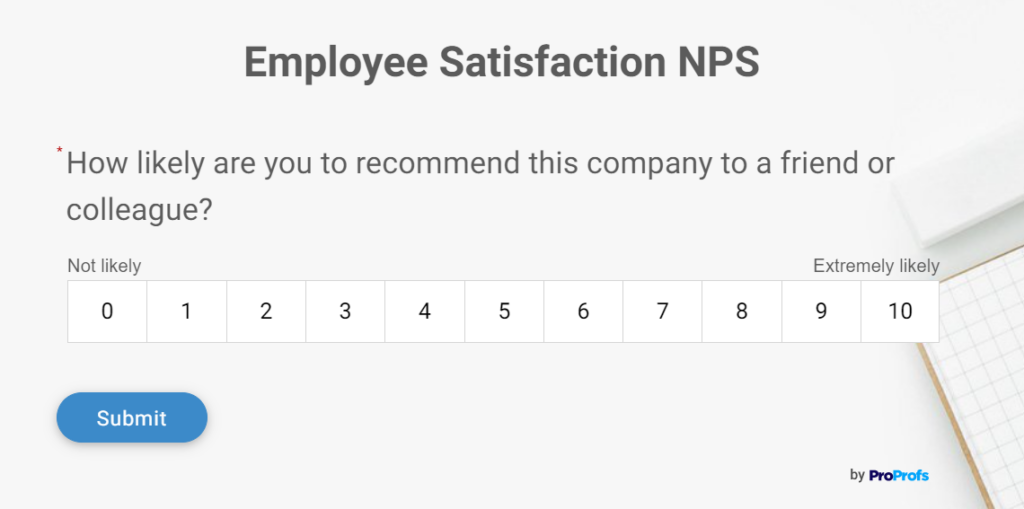
3. Employee Engagement
This template is designed to measure the level of engagement and commitment employees have toward their work and the organization. It includes questions about motivation, job involvement, and satisfaction.
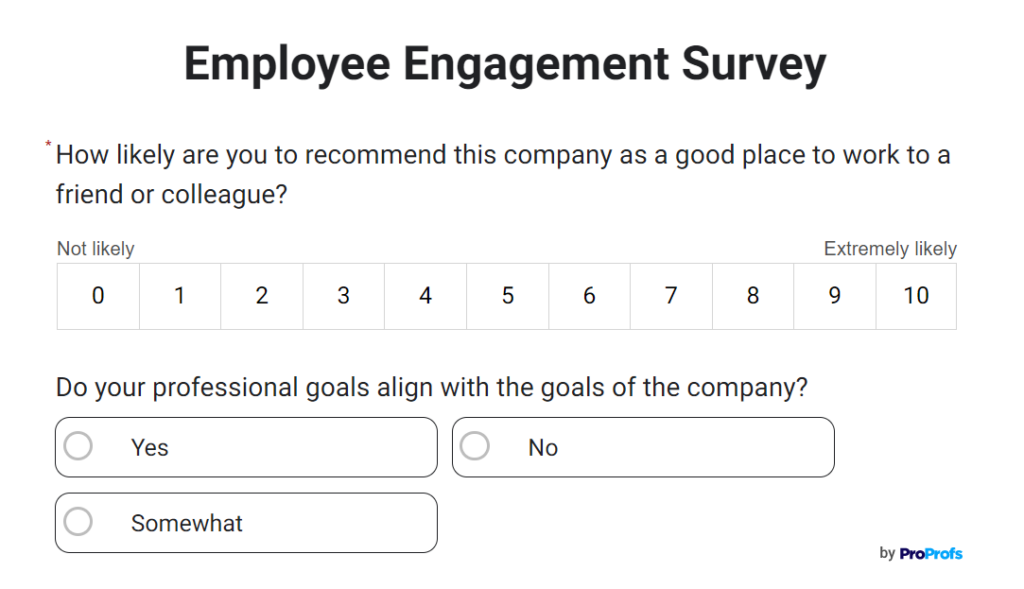
4. Recruitment Satisfaction
This template evaluates the satisfaction levels of new hires regarding their recruitment experience. It helps organizations identify strengths and areas for improvement in their recruitment processes.
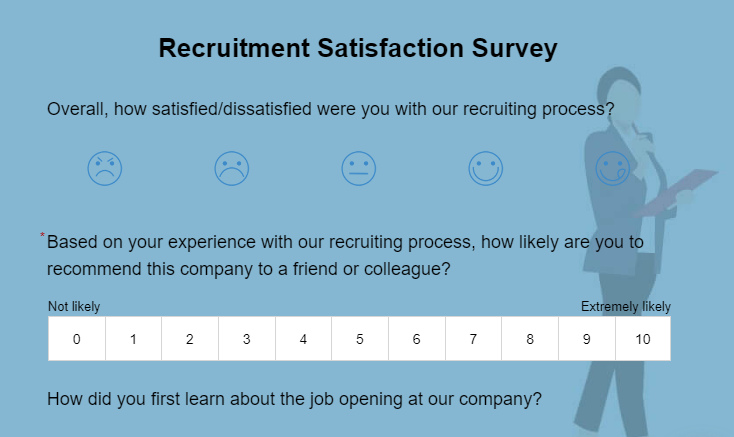
5. Employee Self-Assessment
This template allows employees to assess their own performance, skills, and areas for development. It encourages self-reflection and helps with setting personal goals.
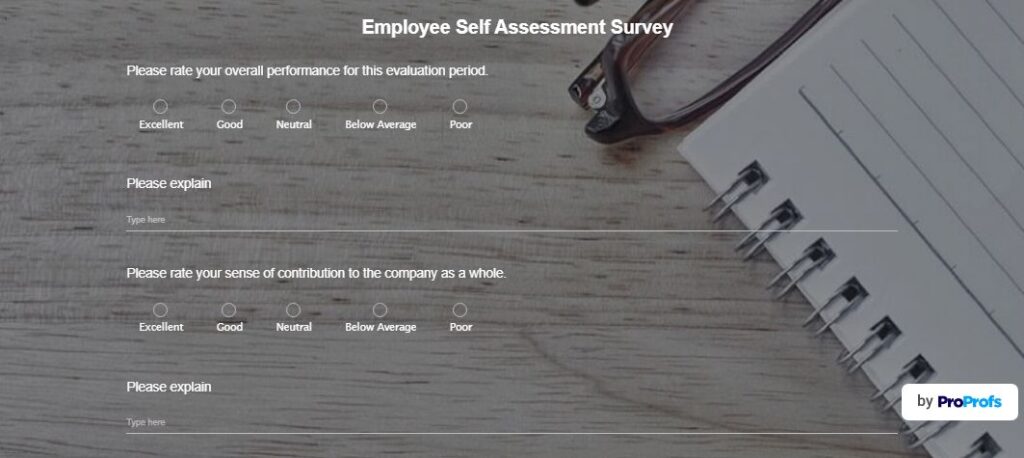
6. Supervisor Evaluation
This template provides a platform for employees to evaluate their supervisors. It assesses the effectiveness of supervisors’ communication, leadership, and support towards their team members.
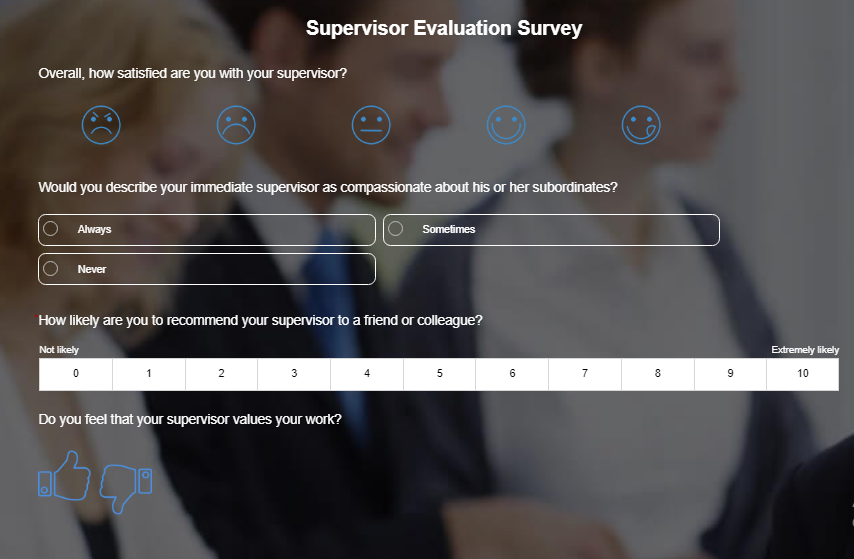
7. Department Performance
This template assesses the overall performance and effectiveness of different departments within the organization. It helps identify department-specific strengths and areas for improvement.
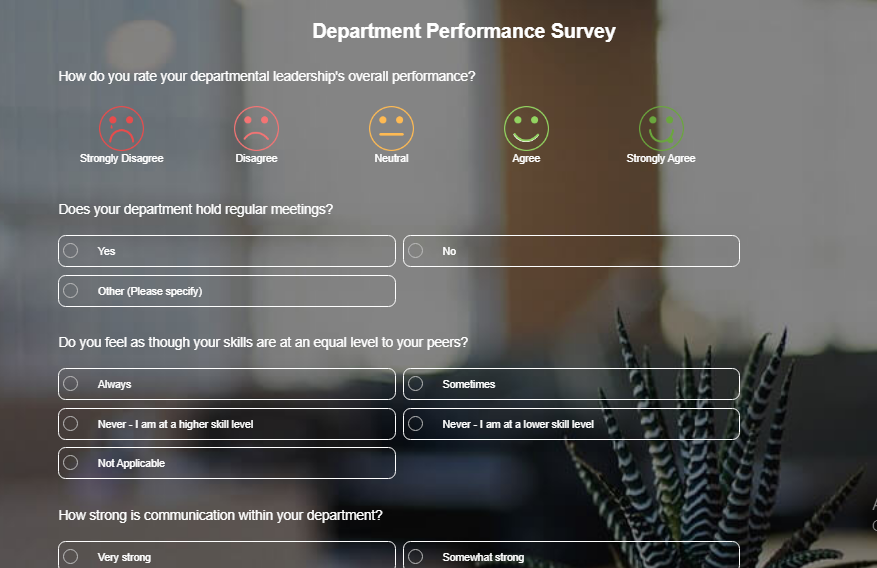
8. Team Performance
This template focuses on evaluating the performance and dynamics within teams. It measures collaboration, communication, and productivity within the team.
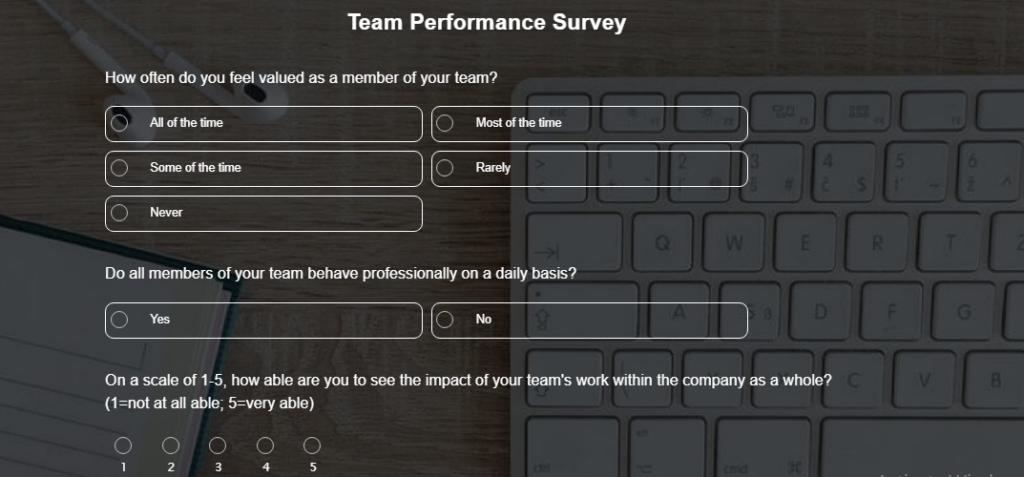
9. Employee Benefits
This template collects feedback on employee benefits such as healthcare plans, retirement options, vacation policies, and other benefits offered by the organization.
10. Employee Exit
This template is used to gather feedback from employees who are leaving the organization. It helps identify reasons for turnover and areas where the organization can improve retention.
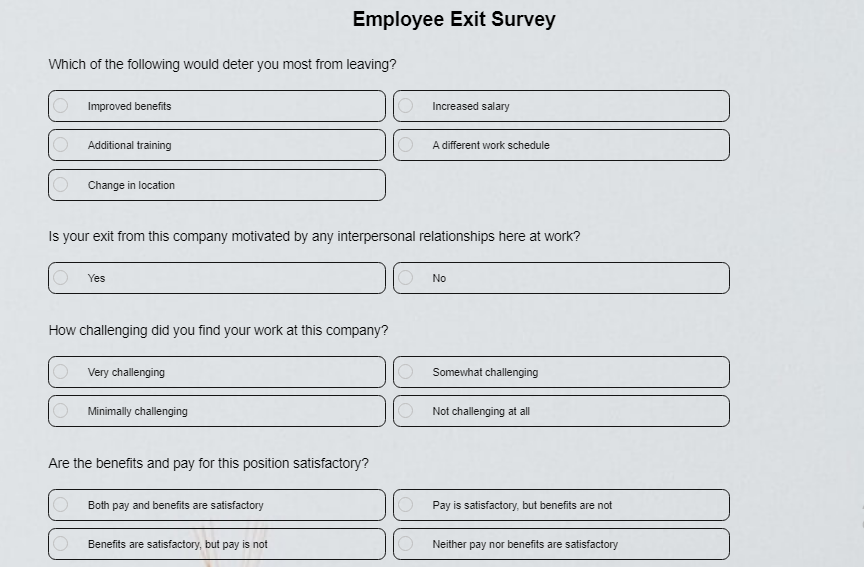
11. Employee New Hire
This template is specifically designed for new employees to provide feedback on their onboarding experience and initial impressions of the organization.
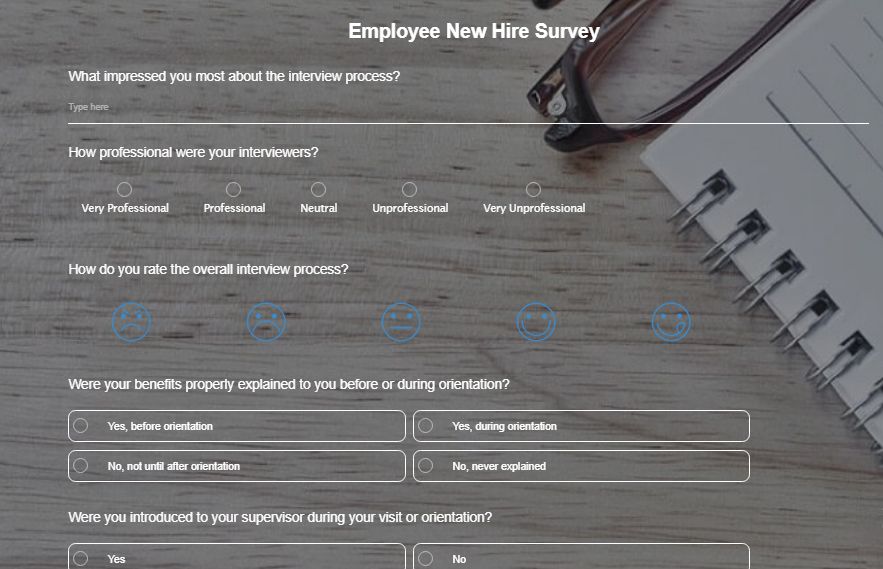
12. Employee Performance
This template evaluates individual employee performance and helps identify areas for improvement, set goals, and provide targeted feedback.
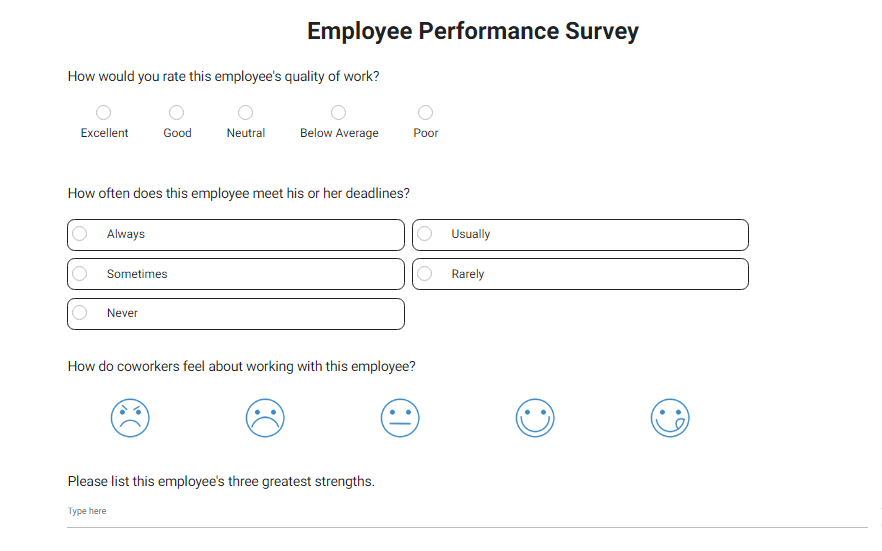
13. Workplace Satisfaction
This template measures employee satisfaction with the overall work environment, facilities, and amenities provided by the organization.
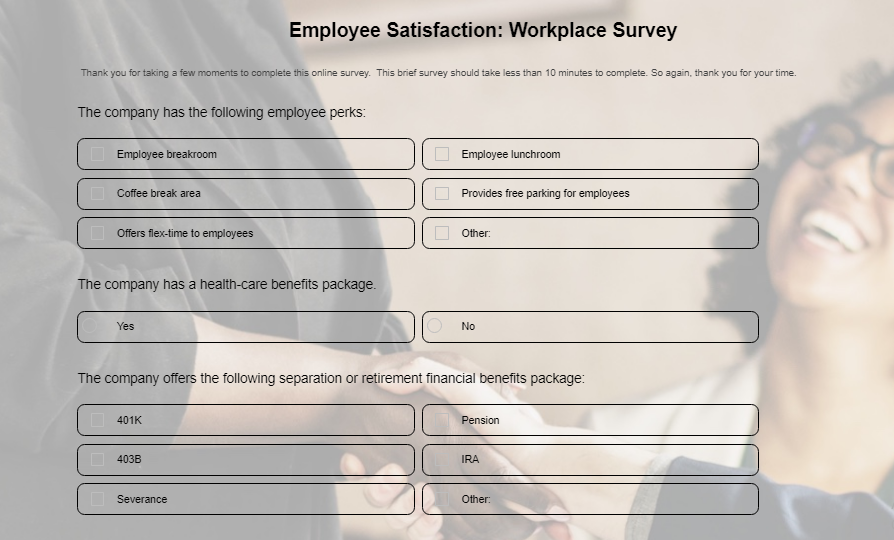
14. HR Satisfaction
This template focuses on collecting feedback from employees regarding their satisfaction with HR practices, policies, and processes within the organization.
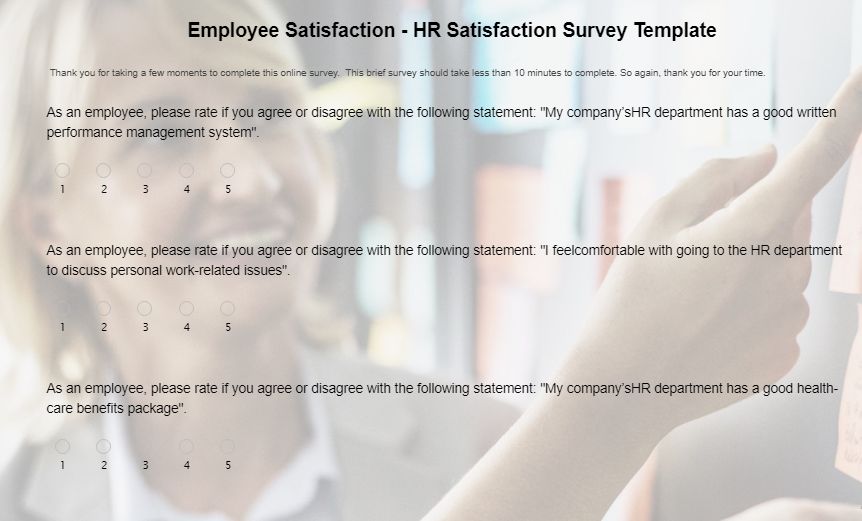
15. Employee Training
This template assesses the effectiveness and satisfaction levels of training and development efforts provided to employees.
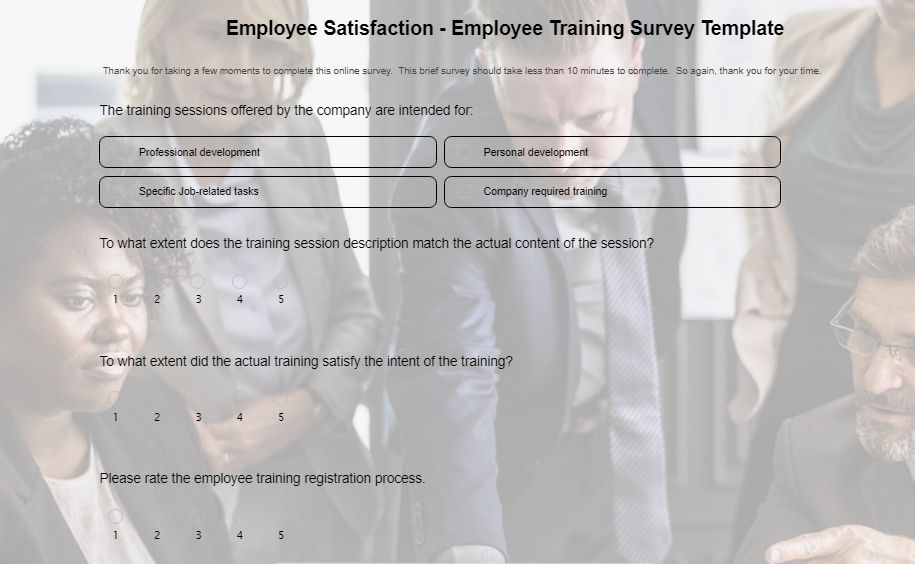
16. Employee Opinion
This template invites employees to share their opinions and suggestions on various aspects of the organization, such as communication, decision-making, and company values.
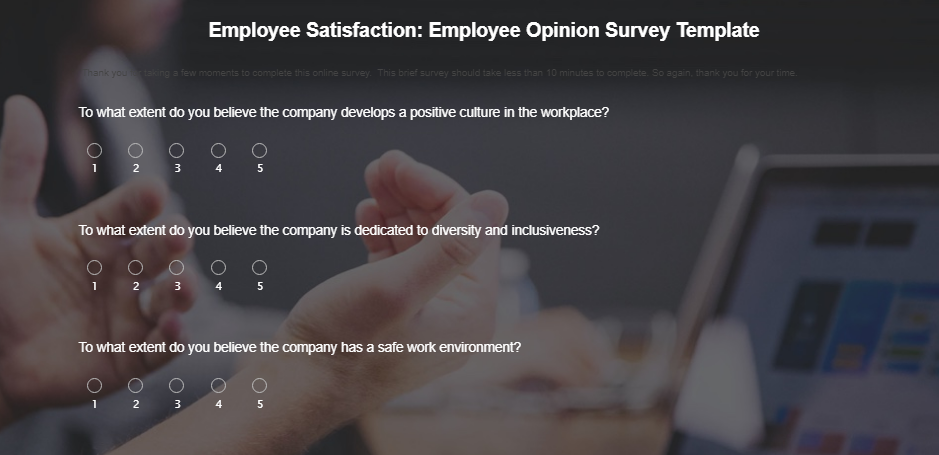
17. Employee Motivation
This template gauges employee motivation levels and identifies factors that affect their motivation at work.
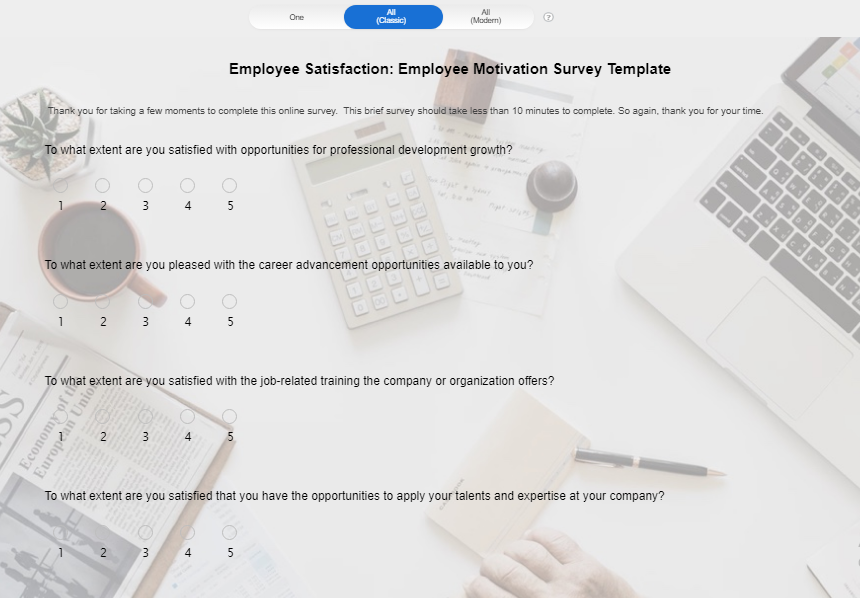
18. Job Satisfaction
This template measures the overall satisfaction levels of employees with their job roles, responsibilities, and work tasks.
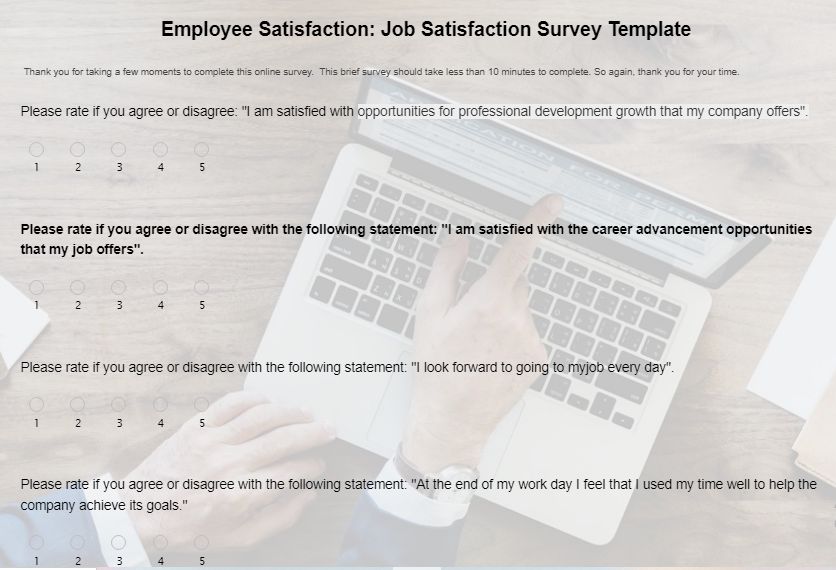
19. Employee Feedback
This template allows employees to provide feedback on various aspects of the organization, including processes, policies, and procedures.
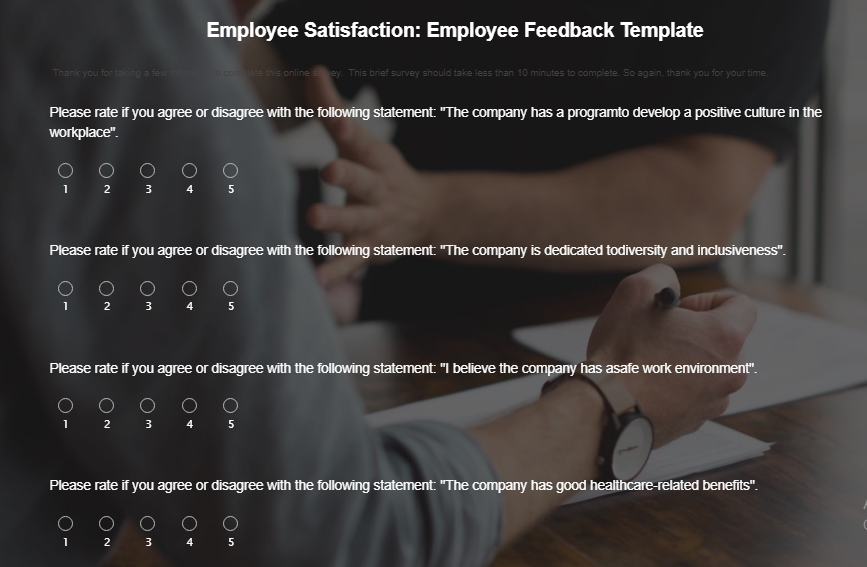
20. Employee Climate
This template assesses the overall organizational climate and aims to identify strengths and areas for improvement to foster a positive work environment.
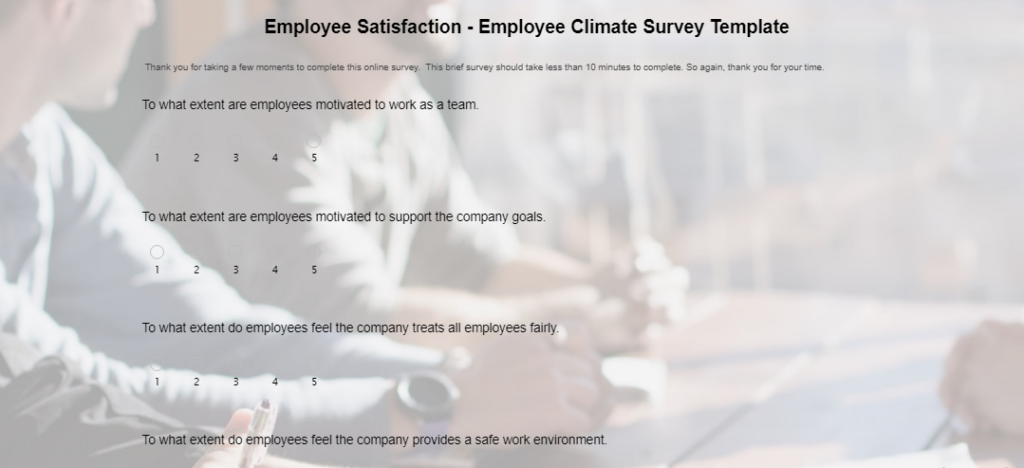
21. Employee Attitude
This template focuses on understanding the attitudes and perceptions of employees towards their work, colleagues, and the organization.
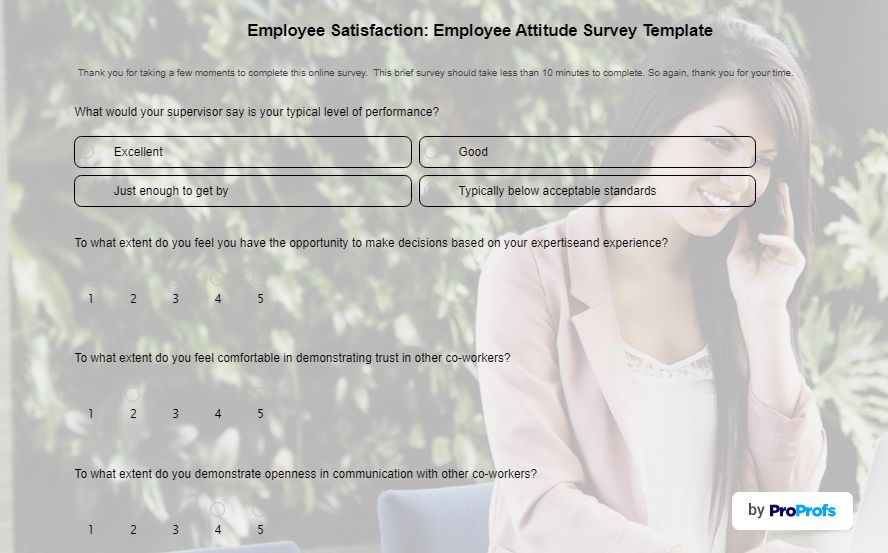
22. 360-degree Employee Evaluation
This template provides a comprehensive evaluation of an employee’s performance by collecting feedback from supervisors, peers, and subordinates.
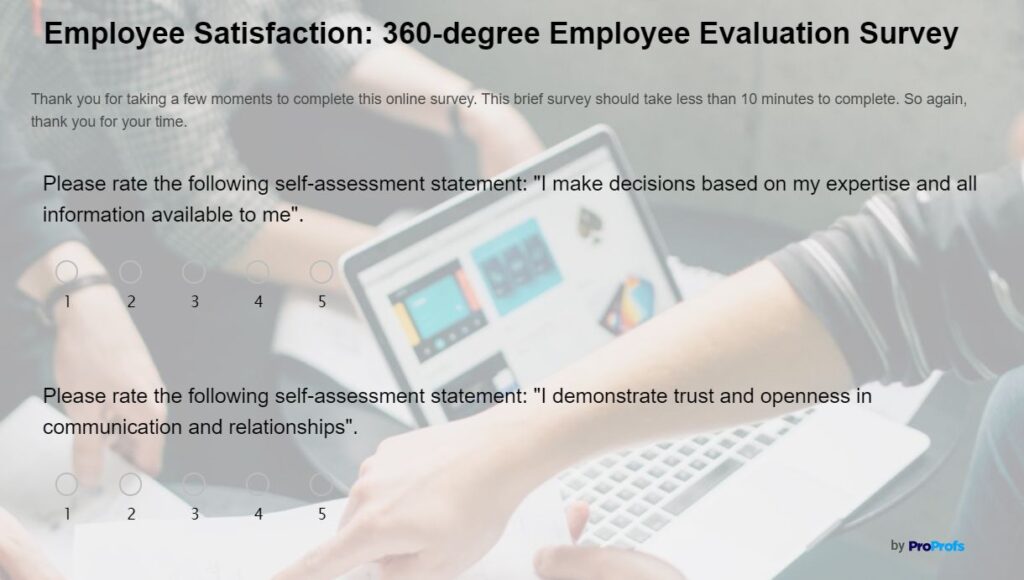
Create the Best Employee Surveys with Comprehensive Employee Survey Templates
Employee surveys are invaluable tools that offer deep insights into the health of an organization. By carefully crafting surveys and utilizing comprehensive templates like those offered by ProProfs Survey Maker, you can foster a culture of continuous improvement and engagement.
Ultimately, the goal is to build a workplace where every employee feels heard, valued, and motivated to contribute their best.
Get a demo or sign up for the free trial to create effective employee surveys in just a few minutes!
FREE. All Features. FOREVER!
Try our Forever FREE account with all premium features!







